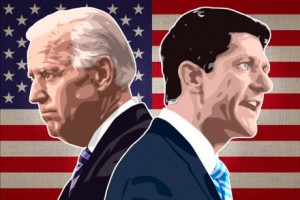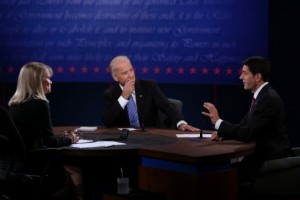That’s Debatable: Truth and Values in the Vice-Presidential Debate
 The first two questions asked after any debate are: who lied, and more importantly, who won? The Vice-Presidential debates are no exception. Seconds after the debate ended on Thursday evening the Internet exploded with fact-checking and speculations on whether Joe Biden or Paul Ryan won the debate that night—and when this happens, the American people lose. Who won or lost the debate is actually largely irrelevant. Studies consistently show that there are very few presidential debates, and even fewer VP debates, that make a huge difference in the dynamics of a campaign—other than a few exceptions where the race was incredibly narrow, as in 1960 or 2000, and the performance of candidates had some impact. Trying to answer the question then, who won or lost, is one that has a limited answer that tells us very little about who the candidates are or how they envision the future of the country. Now, fact-checking is an essential part of any debate, but we have to ask ourselves, what does it really tell us? In both the first Presidential debate and the Vice-Presidential debate what we learned was that both candidates stretched the truths, with a few truths and out-and-out lies thrown in for variety. Knowing who is telling the bald-faced lies is important, but again, asking who’s lying and who’s telling the truth is a limiting question with limited answers.
The first two questions asked after any debate are: who lied, and more importantly, who won? The Vice-Presidential debates are no exception. Seconds after the debate ended on Thursday evening the Internet exploded with fact-checking and speculations on whether Joe Biden or Paul Ryan won the debate that night—and when this happens, the American people lose. Who won or lost the debate is actually largely irrelevant. Studies consistently show that there are very few presidential debates, and even fewer VP debates, that make a huge difference in the dynamics of a campaign—other than a few exceptions where the race was incredibly narrow, as in 1960 or 2000, and the performance of candidates had some impact. Trying to answer the question then, who won or lost, is one that has a limited answer that tells us very little about who the candidates are or how they envision the future of the country. Now, fact-checking is an essential part of any debate, but we have to ask ourselves, what does it really tell us? In both the first Presidential debate and the Vice-Presidential debate what we learned was that both candidates stretched the truths, with a few truths and out-and-out lies thrown in for variety. Knowing who is telling the bald-faced lies is important, but again, asking who’s lying and who’s telling the truth is a limiting question with limited answers.
What neither of these questions gets at is the issue of what kind of President, or Vice-President, will be in the White House. By forcing viewers to consistently think in a win/lose paradigm, where the only criteria to win is fact based, we miss the larger implications of these debates, namely, what they tell us about the values that guide these candidates and the larger campaigns. There were two particular moments in the debate that gave voters insight into Biden and Ryan specifically and the campaigns more generally.
The first is a question of foreign policy. During a heated conversation on the topic of Syria moderator Martha Raddatz turned the question from specifics to general, and asked Paul Ryan his criteria for intervention, not just in Syria, but worldwide. His answer was simple. Intervention is appropriate when it is “in the national interests of the American people.” Raddatz pushed him on this answer by bringing up the issue of humanitarian intervention. Ryan merely reiterated that intervention must “be in the strategic national interests of our country.” Regardless of whether you agree with Ryan, this is an answer that provides a lot of insight into the underlying values of a Romney/Ryan ticket in regards to foreign policy. At the end of Word War II, President Truman stated that, “it must be the policy of the United States to support free peoples who are resisting attempted subjugation by armed minorities or outside pressures.” Since then this has been a determining factor in foreign policy—just look at our justifications for the first Gulf War, and later justifications for the current Iraqi war. However, Ryan’s take on this policy frames the issue not as a matter of spreading freedom and democracy, but as one of personal interest. Democracy is only worth fighting for when it benefits the United States. This is not a new position on foreign policy, but for Ryan to state it so boldly and unequivocally is telling. Following this line of argument, voters have to ask themselves, what does this mean for our national identity? Are we ultimately a selfish country that can and should ignore mass genocide if intervention is not in the interests of America? What will the impact be on other forms of national policy? Will we tolerate corrupt governments if it’s in our best interest? Are we ready to abandon the tradition of liberal internationalism dating back to Woodrow Wilson in order to adopt a strategy of political realism vis-à-vis Nixon?
 The second question I would like to touch on was raised by Raddatz towards the end of the debate, when she questioned both Biden and Ryan on their Catholic religion and it’s impact on the issue of abortion. Both candidates had thoughtful, measured answers to this question. Ryan argued that the private and the public cannot be separated, that his faith is a part of who he is and informs the way he sees the world, particularly in the case of abortion. Biden, on the other hand, acknowledged the role religion played in his personal life, that he accepts the Catholic Church’s stance on abortion, but that he refuses to “impose [my religion] on equally devout Christians and Muslims and Jews.” What this question really answers for voters is bigger than just the abortion issue though. It tells us that religion will drive Ryan’s policy, whereas policy and religion are largely separate for Biden. This is an important aspect of Biden and Ryan’s character, and reveals to us a deeper understanding of how they think and reason, and how they will handle any number of issues in the future. It also begs the question of the role of religion in Mitt Romney’s personal and political life. We are currently in the middle of yet another historic campaign, where neither candidate fully conforms to the Presidential norms of white and Christian. In the past Obama has had to account for both his race and, most notably in 2008, his religion, while Romney has yet to address either of these issues. Ryan has obviously cued voters in to the role of religion in his political life, but in the next Presidential debate, voters should ask themselves, what role does it play for Mitt Romney?
The second question I would like to touch on was raised by Raddatz towards the end of the debate, when she questioned both Biden and Ryan on their Catholic religion and it’s impact on the issue of abortion. Both candidates had thoughtful, measured answers to this question. Ryan argued that the private and the public cannot be separated, that his faith is a part of who he is and informs the way he sees the world, particularly in the case of abortion. Biden, on the other hand, acknowledged the role religion played in his personal life, that he accepts the Catholic Church’s stance on abortion, but that he refuses to “impose [my religion] on equally devout Christians and Muslims and Jews.” What this question really answers for voters is bigger than just the abortion issue though. It tells us that religion will drive Ryan’s policy, whereas policy and religion are largely separate for Biden. This is an important aspect of Biden and Ryan’s character, and reveals to us a deeper understanding of how they think and reason, and how they will handle any number of issues in the future. It also begs the question of the role of religion in Mitt Romney’s personal and political life. We are currently in the middle of yet another historic campaign, where neither candidate fully conforms to the Presidential norms of white and Christian. In the past Obama has had to account for both his race and, most notably in 2008, his religion, while Romney has yet to address either of these issues. Ryan has obviously cued voters in to the role of religion in his political life, but in the next Presidential debate, voters should ask themselves, what role does it play for Mitt Romney?


